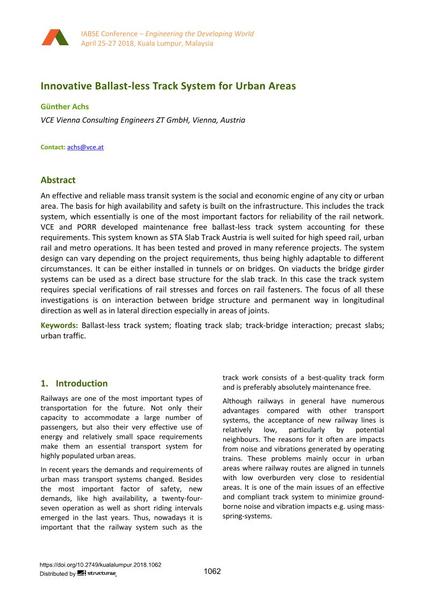Innovative Ballast-less Track System for Urban Areas

|
|
|||||||||||
Détails bibliographiques
| Auteur(s): |
Günther Achs
(VCE Vienna Consulting Engineers ZT GmbH, Vienna, Austria)
|
||||
|---|---|---|---|---|---|
| Médium: | papier de conférence | ||||
| Langue(s): | anglais | ||||
| Conférence: | IABSE Conference: Engineering the Developing World, Kuala Lumpur, Malaysia, 25-27 April 2018 | ||||
| Publié dans: | IABSE Conference Kuala Lumpur 2018 | ||||
|
|||||
| Page(s): | 1062-1069 | ||||
| Nombre total de pages (du PDF): | 8 | ||||
| DOI: | 10.2749/kualalumpur.2018.1062 | ||||
| Abstrait: |
An effective and reliable mass transit system is the social and economic engine of any city or urban area. The basis for high availability and safety is built on the infrastructure. This includes the track system, which essentially is one of the most important factors for reliability of the rail network. VCE and PORR developed maintenance free ballast-less track system accounting for these requirements. This system known as STA Slab Track Austria is well suited for high speed rail, urban rail and metro operations. It has been tested and proved in many reference projects. The system design can vary depending on the project requirements, thus being highly adaptable to different circumstances. It can be either installed in tunnels or on bridges. On viaducts the bridge girder systems can be used as a direct base structure for the slab track. In this case the track system requires special verifications of rail stresses and forces on rail fasteners. The focus of all these investigations is on interaction between bridge structure and permanent way in longitudinal direction as well as in lateral direction especially in areas of joints. |
||||
